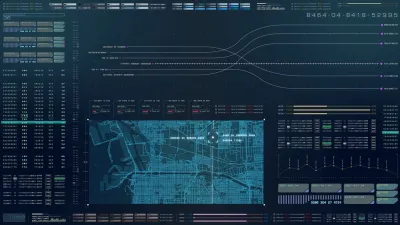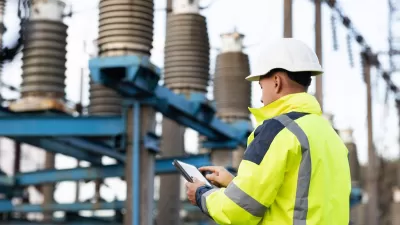Experts from Forbes compiled a list of technologies they say will have the greatest impact on urban living, and several of them will have major impacts on urban planning practice.

In a recent Forbes article, experts on its Technology Council pulled together a list of smart city technologies they say will transform urban living in the not-so-distant future. “Advances in managing everything from transportation to waste management promise to have a significant impact on residents and businesses, improving everyone’s overall quality of life,” the article reads.
Of the 19 trends identified, here are the 12 that have the most relevance to urban planners and related professionals:
- Autonomous vehicles “will transform mobility.”
- “Cognitive cities” technology powered by AI will make “concepts such as ‘smart cities as a service’ a reality.”
- Geolocation data will help cities enhance services for taxpayers and allow for better resource planning for businesses.
- “Context aware” computing that uses AI to build upon the Internet of Things will allow smart cities ”to be able to react more quickly and accurately to user needs and intents.”
- Air taxis have the potential to support urban development, reduce traffic congestion, and drastically reduce the delivery of emergency and medical supplies.
- AI-powered public transit will allow for “dynamically adjusting routes and schedules based on real-time data to minimize wait times and maximize efficiency.”
- Flexible workplaces and “pilot labs” may fill some of vacant commercial spaces cities are currently struggling with.
- Intelligent waste management will “monitor waste levels, optimize collection routes and enhance recycling. This reduces fuel consumption, lowers carbon emissions and minimizes landfill use.”
- Automated public transit payment systems will increase convenience of public transit for users.
- Intelligent traffic management systems will “use real-time data and advanced technology to improve traffic flows, reduce congestion and make public transportation more efficient.”
- Smart parking systems will “use sensors, cameras and data analytics to provide real-time information on parking space availability,” allowing drivers to “use mobile apps to find and reserve available parking spots, reducing the time spent searching for parking and decreasing traffic congestion.”
- Micro-mobility hubs will integrate electric bikes, scooters and car-sharing options, all accessible via a unified digital platform.
For the full list of 19 trends, check out the original Forbes article linked below.
FULL STORY: 19 Smart City Technologies And How They’ll Transform Urban Living

Maui's Vacation Rental Debate Turns Ugly
Verbal attacks, misinformation campaigns and fistfights plague a high-stakes debate to convert thousands of vacation rentals into long-term housing.

Planetizen Federal Action Tracker
A weekly monitor of how Trump’s orders and actions are impacting planners and planning in America.

In Urban Planning, AI Prompting Could be the New Design Thinking
Creativity has long been key to great urban design. What if we see AI as our new creative partner?

King County Supportive Housing Program Offers Hope for Unhoused Residents
The county is taking a ‘Housing First’ approach that prioritizes getting people into housing, then offering wraparound supportive services.

Researchers Use AI to Get Clearer Picture of US Housing
Analysts are using artificial intelligence to supercharge their research by allowing them to comb through data faster. Though these AI tools can be error prone, they save time and housing researchers are optimistic about the future.

Making Shared Micromobility More Inclusive
Cities and shared mobility system operators can do more to include people with disabilities in planning and operations, per a new report.
Urban Design for Planners 1: Software Tools
This six-course series explores essential urban design concepts using open source software and equips planners with the tools they need to participate fully in the urban design process.
Planning for Universal Design
Learn the tools for implementing Universal Design in planning regulations.
planning NEXT
Appalachian Highlands Housing Partners
Mpact (founded as Rail~Volution)
City of Camden Redevelopment Agency
City of Astoria
City of Portland
City of Laramie





























